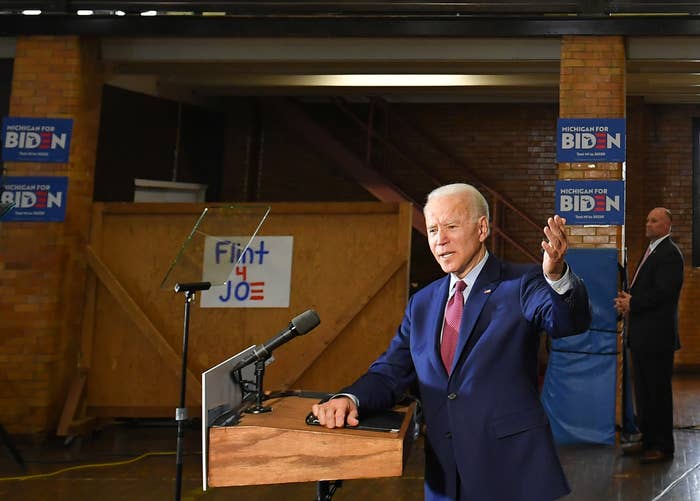
FLINT, Michigan — As the political world turns its attention to Michigan’s primary on Tuesday night, the people of Flint are very much still in crisis.
Flint residents have continued to die of Legionnaires disease. The city is dealing with ongoing fallout: Children whose neurological development may have been irreversibly damaged; pregnant women who had miscarriages after drinking the contaminated water — the number of miscarriages spiked by 58% after the water was switched; people whose trust in their elected officials and reliance on the infrastructure that runs through their city has been turned upside down; and corroded pipes in people’s homes that have yet to be replaced.
On Monday, Joe Biden passed through — flanked by Sen. Cory Booker, Flint Mayor Sheldon Neeley, and Michigan Lt. Gov. Garlin Gilchrist. The attention from national politicians should conceivably be a good thing but much to the frustration of local community leaders, Biden barely mentioned the ongoing disaster during his stop there, instead repeating his stump speech and touting endorsements.
Those who met with the campaign before Biden’s visit were disappointed and angry that the former vice president mentioned the water crisis just once, 20 minutes into the private event he held in town, as part of a line taking aim at Sen. Bernie Sanders, and focused on showcasing endorsements from other politicians.
"We're not looking for a revolution. What we want to do is to be able to trust the water that comes out of the pipes," Biden told the gathering, still fresh off the victories of the past week, delivered largely by black voters.
Dr. Kent Key, a Flint local and public health expert at Michigan State University’s College of Human Medicine, said he’d sat down with the campaign on Sunday after they reached out for advice on what steps would mean something for people in Flint. He said he was disheartened to see Biden “not really talking about the water crisis. And to not acknowledge that it's not over.”
“When people who have power to elevate your story come and totally disregard your story, you’re retraumatized,” he said on Monday, after he walked out of the event early because he didn’t think Biden was addressing the residents’ ongoing crisis in a way that was respectful or helpful.
“It’s almost like being on the stranded island and you hear the helicopter and you get excited, oh good, somebody is going to be able to elevate me, lift me up,” he said. “And then when they don’t, you sink down into this despair, this mental anguish, this distress.”
“The Flint water crisis is not over. No one took accountability for it. It was not a natural disaster. It was a man-made disaster, which makes it different from any other water crisis,” Key said.
He, and another local community advocate, Marseille Allen, told the campaign it was important to hold a public event and to focus on the community and not elected leaders — who residents no longer trust — as the crisis drags on in various forms, six years after it began because of a cost-cutting government measure to switch the city’s water source.
The Biden campaign did not respond to requests for comment.
At the beginning of last summer, as the first presidential candidate of the 2020 election cycle passed through Flint, Key was already concerned about politicians using his town as a token of their commitment to black voters, without understanding that people in Flint are still in crisis. Nine months later, as Michigan residents prepared to cast ballots in the primary and with the Democratic field winnowed down to two, that is exactly what he saw happening.
“We are experiencing what I call water fatigue,” Key told BuzzFeed News in June. “They’re emotionally and psychologically tired. They’re tired physiologically with their health because of the effects of it. People are fatigued, and the last thing we need to do is waste any of our energy on something that’s not going to be productive.”
Locals say this could have been an opportunity for the candidate to show black communities — who Biden says were solely responsible for his campaign’s comeback in recent weeks — that he understands and takes seriously the systemic failures and lasting trauma in Flint.
Community advocates said that both Biden and Sanders’ approaches to Flint have been disappointing — and that events were hastily arranged in the past week ahead of the primary. Sanders did visit the town in 2018 and held an event on Saturday that included a local activist and was open to the public.
But his event also drew criticism after his campaign promised a speech about racial inequality that turned mostly into a regular stump speech. Journalists at the event said the room was filled with mostly white attendees, in a town that’s 53% black, and where the black community was disproportionately hit by the contaminated water.
Nayyirah Shariff, another resident and activist, was asked by Sanders’ campaign to speak at his event on Saturday. She said she thought the audience wasn’t particularly less diverse than other public events she’s attended in several years working in Flint, and appreciated the open format and the platform for her to talk about what’s happening there, but said the Sanders campaign’s last-minute approach was also disappointing.
“These things happen at the last minute. Like we’re just expected to drop everything and be grateful, like we’re not fighting for our lives here in Flint,” Shariff told BuzzFeed News.
Marseille Allen, a community activist who supported Sen. Kamala Harris’s campaign, also met with the Biden campaign when they reached out for advice. She said she was hearing from local activists and seeing their posts on social media railing against the way Biden spoke about Flint.
“Before it was even over, I got a bunch of text messages and calls from some activists,” she said. “They’re livid … you can't put up a bunch of politicians that nobody likes and think that we’re going to vote for him.”
Allen organized meetings for Harris’s husband, Doug Emhoff, on his visit to Flint last year — she said that was an example of the right way to visit Flint, without cameras and based around meetings with community members.
She said she's not endorsing any candidates, instead focusing on local issues, but would get more involved if Harris asks her to. She, too, told them to hold a public event and to focus on the experiences of people in Flint, rather than generalized talking points from public officials.
“They should have listened to me, because they’re getting slammed on social media,” she said.
As Biden praised the work of the state and city governments in Flint, local news outlets broke the story that the city government is, for the second time, in violation of the federal Safe Water Drinking Act after failing to collect enough samples from residents’ homes to test water quality.

